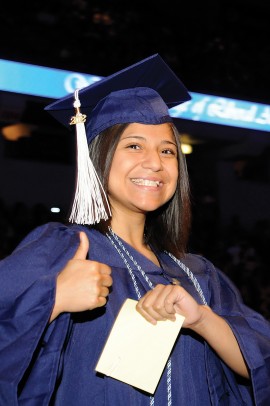Helping undergraduates succeed

The UIC Student Success Plan aims to help advance undergraduate students to graduation.
Photo: UIC Photo Services
How can UIC help its undergraduates excel?
That’s the question administrators are asking through the UIC Student Success Plan initiative, a campus-wide program to help students advance through their undergraduate studies.
“The goal is to increase the success of UIC students, and that success can be defined as retention, graduation, future employment and meeting the students’ needs while they’re here,” said Barbara Henley, vice chancellor for student affairs.
“The bottom line is, we want the absolute best for our students. And the best thing they can have is a UIC degree.”
Students and employees can share their thoughts on the plan at two town hall meetings next week or online through Nov. 19.
Town halls will be held 10 to 11:30 a.m. Monday in the Student Services Building conference rooms and 3:30 to 5 p.m. Oct. 31 in the Michele M. Thompson Rooms, Student Center West.
UIC’s six-year graduate rate has continued to increase, from 31 percent about 15 years ago to 58 percent today.
Still, there’s more work to do, said Lon Kaufman, vice chancellor for academic affairs and provost.
“We have a commitment and a responsibility to the students that we accept,” Kaufman said.
“We have a very diverse population and we educate a lot of students who would not otherwise have that opportunity. That’s uniquely important to the campus and the state.”
Directed by Chancellor Paula Allen-Meares, the Undergraduate Policy Council (which includes deans, the university librarian, dean of students, vice provost for undergraduate affairs and vice provost for academic and enrollment serves) identified eight target areas that will each be assigned to a task force review.
Task forces should conclude their work in the spring, Kaufman said. Each group will pinpoint what’s effective and what needs strengthening in the areas of:
• data analysis and assessment
• targeted first-year curriculum
• support for student learning
• faculty engagement
• advising
• financing college
• campus life
• pre-matriculation issues.
“We might need to look at what we have and ask, ‘Is this the right thing to have at this specific time? Is it making a difference? What can we learn from it?’” Henley said.
The university reviews its academic programs about every eight years, but there isn’t a formal review process for student support programs, Kaufman said.
“This year we will take a look at these academic and student support units,” he said. “How are they working and what could we augment? What do we need to change? Where are we spending money that’s not working?
“The goal is to make sure they’re helping students move forward and that the students are aware of them so they can take advantage.”
This year, the task forces will focus on ways to help students transition from high school throughout their first year of college, Kaufman said. Next year, the groups will address ways to enhance the second-year experience.
“‘Success’ is different than just being retained — it truly means being successful in terms of being well positioned to go forward and graduate,” Kaufman said.
“It’s really about being dedicated to our undergraduate population and saying, ‘This is our mission.”
